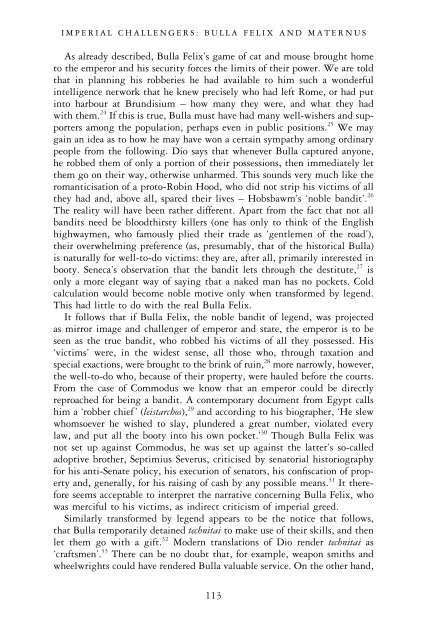You also want an ePaper? Increase the reach of your titles
YUMPU automatically turns print PDFs into web optimized ePapers that Google loves.
IMPERIAL CHALLENGERS: BULLA FELIX AND MATERNUS<br />
As already described, Bulla Felix’s game of cat and mouse brought home<br />
to the emperor and his security forces the limits of their power. We are told<br />
that in planning his robberies he had available to him such a wonderful<br />
intelligence network that he knew precisely who had left Rome, or had put<br />
into harbour at Brundisium – how many they were, and what they had<br />
with them. 24 If this is true, Bulla must have had many well-wishers and supporters<br />
among the population, perhaps even in public positions. 25 We may<br />
gain an idea as to how he may have won a certain sympathy among ordinary<br />
people from the following. Dio says that whenever Bulla captured anyone,<br />
he robbed them of only a portion of their possessions, then immediately let<br />
them go on their way, otherwise unharmed. This sounds very much like the<br />
romanticisation of a proto-Robin Hood, who did not strip his victims of all<br />
they had and, above all, spared their lives – Hobsbawm’s ‘noble bandit’. 26<br />
The reality will have been rather different. Apart from the fact that not all<br />
bandits need be bloodthirsty killers (one has only to think of the English<br />
highwaymen, who famously plied their trade as ‘gentlemen of the road’),<br />
their overwhelming preference (as, presumably, that of the historical Bulla)<br />
is naturally for well-to-do victims: they are, after all, primarily interested in<br />
booty. Seneca’s observation that the bandit lets through the destitute, 27 is<br />
only a more elegant way of saying that a naked man has no pockets. Cold<br />
calculation would become noble motive only when transformed by legend.<br />
This had little to do with the real Bulla Felix.<br />
It follows that if Bulla Felix, the noble bandit of legend, was projected<br />
as mirror image and challenger of emperor and state, the emperor is to be<br />
seen as the true bandit, who robbed his victims of all they possessed. His<br />
‘victims’ were, in the widest sense, all those who, through taxation and<br />
special exactions, were brought to the brink of ruin, 28 more narrowly, however,<br />
the well-to-do who, because of their property, were hauled before the courts.<br />
From the case of Commodus we know that an emperor could be directly<br />
reproached for being a bandit. A contemporary document from Egypt calls<br />
him a ‘robber chief ’ (leistarchos), 29 and according to his biographer, ‘He slew<br />
whomsoever he wished to slay, plundered a great number, violated every<br />
law, and put all the booty into his own pocket.’ 30 Though Bulla Felix was<br />
not set up against Commodus, he was set up against the latter’s so-called<br />
adoptive brother, Septimius Severus, criticised by senatorial historiography<br />
for his anti-Senate policy, his execution of senators, his confiscation of property<br />
and, generally, for his raising of cash by any possible means. 31 It therefore<br />
seems acceptable to interpret the narrative concerning Bulla Felix, who<br />
was merciful to his victims, as indirect criticism of imperial greed.<br />
Similarly transformed by legend appears to be the notice that follows,<br />
that Bulla temporarily detained technitai to make use of their skills, and then<br />
let them go with a gift. 32 Modern translations of Dio render technitai as<br />
‘craftsmen’. 33 There can be no doubt that, for example, weapon smiths and<br />
wheelwrights could have rendered Bulla valuable service. On the other hand,<br />
113


